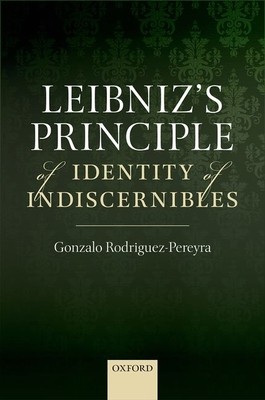
- We will send in 10–14 business days.
- Author: Gonzalo Rodriguez-Pereyra
- Publisher: Oxford University Press, USA
- ISBN-10: 0198712669
- ISBN-13: 9780198712664
- Format: 16.3 x 23.6 x 2.3 cm, hardcover
- Language: English
- SAVE -10% with code: EXTRA
Leibniz's Principle of Identity of Indiscernibles (e-book) (used book) | bookbook.eu
Reviews
Description
Gonzalo Rodriguez-Pereyra presents an original study of the place and role of the Identity of Indiscernibles in Leibniz's philosophy. The Principle of the Identity of Indiscernibles rules out numerically distinct but perfectly similar things; Leibniz derived it from more basic principles and used it to establish important philosophical theses. Rodriguez-Pereyra aims to establish what Leibniz meant by the Principle of Identity of Indiscernibles, what his arguments for and from it were, and to assess those arguments and Leibniz's claims about the Principle of Identity of Indiscernibles. He argues that Leibniz had a very strong version of the principle, according to which no possibilia (whether or not they belong to the same possible world) are intrinsically perfectly similar, where this excludes things that differ in magnitude alone. The book discusses Leibniz's arguments for the Identity of Indiscernibles in the Meditation on the Principle of the Individual, the Discourse on
Metaphysics, Notationes Generales, Primary Truths, the letter to Casati of 1689, the correspondence with Clarke, as well as the use of the Identity of Indiscernibles in Leibniz's arguments against the Cartesian conception of the material world, atoms, absolute space and time, the Lockean conception of the mind as a tabula rasa, and freedom of indifference. Rodriguez-Pereyra argues that the Identity of Indiscernibles was a central but inessential principle of Leibniz's philosophy.
EXTRA 10 % discount with code: EXTRA
The promotion ends in 17d.22:02:56
The discount code is valid when purchasing from 10 €. Discounts do not stack.
- Author: Gonzalo Rodriguez-Pereyra
- Publisher: Oxford University Press, USA
- ISBN-10: 0198712669
- ISBN-13: 9780198712664
- Format: 16.3 x 23.6 x 2.3 cm, hardcover
- Language: English English
Gonzalo Rodriguez-Pereyra presents an original study of the place and role of the Identity of Indiscernibles in Leibniz's philosophy. The Principle of the Identity of Indiscernibles rules out numerically distinct but perfectly similar things; Leibniz derived it from more basic principles and used it to establish important philosophical theses. Rodriguez-Pereyra aims to establish what Leibniz meant by the Principle of Identity of Indiscernibles, what his arguments for and from it were, and to assess those arguments and Leibniz's claims about the Principle of Identity of Indiscernibles. He argues that Leibniz had a very strong version of the principle, according to which no possibilia (whether or not they belong to the same possible world) are intrinsically perfectly similar, where this excludes things that differ in magnitude alone. The book discusses Leibniz's arguments for the Identity of Indiscernibles in the Meditation on the Principle of the Individual, the Discourse on
Metaphysics, Notationes Generales, Primary Truths, the letter to Casati of 1689, the correspondence with Clarke, as well as the use of the Identity of Indiscernibles in Leibniz's arguments against the Cartesian conception of the material world, atoms, absolute space and time, the Lockean conception of the mind as a tabula rasa, and freedom of indifference. Rodriguez-Pereyra argues that the Identity of Indiscernibles was a central but inessential principle of Leibniz's philosophy.


Reviews